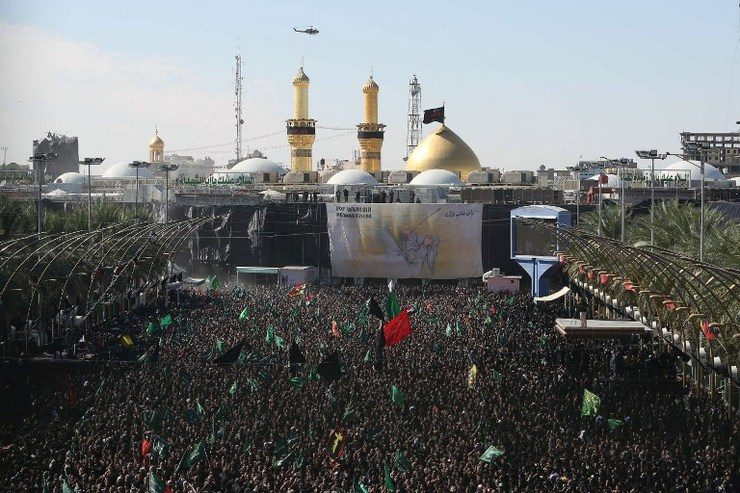SUMMARY
This is AI generated summarization, which may have errors. For context, always refer to the full article.

KARBALA, Iraq – Huge crowds of Shiites gathered in Iraq and Lebanon on Tuesday, November 4, to mark a key holy day in defiance of jihadists from the Islamic State (ISIS) group.
Police and troops were out in force as hundreds of thousands of pilgrims massed in the Iraqi shrine city of Karbala to commemorate Ashura.
Tens of thousands more rallied in Beirut, where the head of the Shiite militant Hezbollah movement, Hassan Nasrallah, pledged “victory” against the Sunni extremists of ISIS.
This year’s commemorations took on new meaning after ISIS seized control of large parts of Iraq and Syria.
The jihadists consider Shiites heretics and have targeted them in deadly attacks, a string of which killed more than 40 people in Baghdad alone in the 48 hours preceding the peak of Ashura on Tuesday.
A US-led coalition has stepped up air strikes in recent days, with Canada saying Tuesday that it had destroyed heavy engineering equipment used by ISIS.
It was also reported on Wednesday, November 5, that Britain will send troops to Iraq to help train local forces.
Iraqis said marking Ashura was “about defying (ISIS) because they declared their hostility and made threats to kill Muslims and bomb the cities and holy shrines,” said Saad Jabbar, 54, who came to Karbala from Dhi Qar province in the south.
Staff Lieutenant General Othman al-Ghanimi told Iraqi state television that “more than three million” people took part in Ashura rituals in Karbala.
The figure could not be independently verified.
The commemorations mark the killing of Imam Hussein, the grandson of the Prophet Mohammed, by the army of the Caliph Yazid in 680 AD, which helped solidify the divide between what would become the Sunni and Shiite branches of Islam.
Self-flagellation ritual
A small minority of Shiites mark the day with a self-flagellation ritual called “tatbeer”, cutting their heads with swords and spears in mourning for the imam.
Hundreds were seen on the streets of Karbala with blood flowing down their heads and over their white robes after the ritual self-harming, which has been condemned by some Shiite clerics.
Thousands dressed in black took part in a ritual run to the shrine of Imam Hussein, before men on horseback re-enacted an attack on his camp, setting fire to a tent that collapsed in a sheet of flame, sending a dark cloud of smoke rising over a massive crowd.
There were no reports of violence against people marking Ashura as of Tuesday night, after more than 25,000 members of the security forces were deployed in Karbala itself and thousands more in Baghdad and along routes to the city.
In Beirut, Nasrallah told supporters in the city’s southern suburbs that Sunni radicals, known as takfiris, “have no future”.
“These takfiris will be defeated in all areas and countries, and we will feel honored that we played a role in their defeat,” he said by video link.
Hezbollah has sent thousands of fighters into neighboring Syria to support the troops of President Bashar al-Assad against the mainly Sunni rebels battling his regime.
Beirut’s southern suburbs – a Hezbollah stronghold – have seen a string of deadly attacks, many of them claimed by jihadists, since the group started sending fighters to Syria three years ago.
“We want to win the final victory… so that the region does not fall into the hands of beheaders… and rapists,” Nasrallah said.
ISIS declared a “caliphate” in areas under its control in June, imposing its harsh interpretation of Islamic law and committing widespread atrocities.
Peshmerga ‘heavily shelling’ ISIS
In Britain, the Times newspaper reported on Wednesday that the government is preparing to send troops to train and advise the Iraqi army, and that training teams could also be sent to the autonomous Kurdish region.
The British Ministry of Defence declined to comment on the report but said an announcement would be forthcoming.
Meanwhile, Canada said its first airstrikes destroyed heavy engineering equipment.
Lieutenant-General Jonathan Vance said ISIS had used the equipment to “divert water from the Euphrates river to create flooding and displace the population in Anbar province, and denying water to other populations downstream.”
In Syria, US-led air strikes in recent days have focused on the besieged town of Kobane on the Turkish border, where local Kurdish militia have been holding off an ISIS offensive for seven weeks.
The jihadists were reported Tuesday to have released at least 93 Syrian Kurds from Kobane who were kidnapped in February while en route to Iraq.
The Syrian Observatory for Human Rights, a Britain-based group that relies on a network of sources on the ground, said about 160 Kurds were abducted at the time and the hostages had been held in the Syrian IS stronghold of Raqa.
Human Rights Watch said meanwhile that ISIS subjected a group of Kobane teenagers to a string of abuses, including torture, during captivity.
The 153 schoolchildren were taken hostage in May, and suffered regular beatings at the hands of the jihadists before being released, said the New York-based watchdog. – With Mohamad Ali Harissi in Beirut, Lebanon, Agence France-Presse/Rappler.com
Add a comment
How does this make you feel?
There are no comments yet. Add your comment to start the conversation.